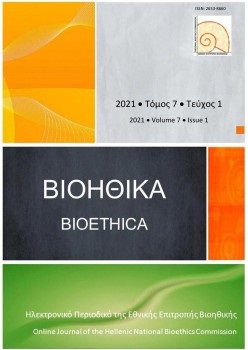AI and the Healthcare sector: Industry, legal and ethical issues

Abstract
In this modern era, AI systems, robotics and all kinds of technological innovations have prevailed in almost every industry there is. Even though, they provide with several advantages and benefits, such novelties, due to their newly found capacities pose a certain undoubted risk for contemporary societies, unfamiliar yet with the full extent of the perils following these kind of innovations.
This article engages in an examination of one of the industries critically changed and influenceδ by AI technology, the healthcare industry, as it possesses the highest bioethical interest. The article, thus, is divided to four sections. The first is dedicated to novel advancements in the field of health care services and medicine, which include the introduction and/or full deployment of machine learning and robotics. Second, as already mentioned due to the fact that these technologies are accompanied by legal concerns, especially in terms of privacy, a legal analysis of the most relevant and prominent concerns is attempted. The emphasis is given on the European Union’s approach on the matter of AI related technology. Both its main bodies are mentioned, the European Parliament and the European Commission, for their procurement of documents related to novel technologies.
In addition, after the legal framework analysis and the more binding in nature legislative efforts, the article proceeds with the presentation of the soft-law related to the AI technological field, as well as the ethics and guidelines developed to mitigate its risks and issues. Lastly, the following analysis is closed by conclusions based on the combination of remarks and resolutions from the above mentioned sections of the article.
Article Details
- How to Cite
-
Dipla, V. (2021). AI and the Healthcare sector: Industry, legal and ethical issues. Bioethica, 7(1), 34–45. https://doi.org/10.12681/bioeth.26540
- Section
- Original Articles

This work is licensed under a Creative Commons Attribution 4.0 International License.
Authors who publish with this journal agree to the following terms:
- Authors retain copyright and grant the journal right of first publication with the work simultaneously licensed under a Creative Commons Attribution CC BY 4.0 License, which allows for immediate free access to the work and permits any user to read, download, copy, distribute, print, search, or link to the full texts of articles, crawl them for indexing, pass them as data to software, or use them for any other lawful purpose. Appropriate credit must be given by citing the author(s) and the original publication in this journal.
- Authors are able to enter into separate, additional contractual arrangements for the non-exclusive distribution of the journal's published version of the work (e.g. post it to an institutional repository or publish it in a book), with an acknowledgement of its initial publication in this journal.
We encourage authors to deposit their articles, as well as data underlying the publications, in institutional and/or other appropriate subject repositories.
Bioethica permits and encourages authors to archive the final publication pdf in institutional (e.g. the repository of the National Hellenic Research Foundation) or other appropriate subject repositories (e.g. SSOAR repository for social sciences), in compliance with institutional and/or funder open access policies, after publication in the BIOETHICA. Authors must provide bibliographic details that credit publication in the journal, as well as related funding details (when applicable).
Lists of institutional and other subject-based academic open access repositories can be found listed by country at the registry http://opendoar.org/countrylist.php
If your institution does not possess a repository you may deposit a copy of your paper at no cost with www.zenodo.org , the repository supported for open access research in the EU by the European Commission, through the project OpenAIRE (www.openaire.eu )


